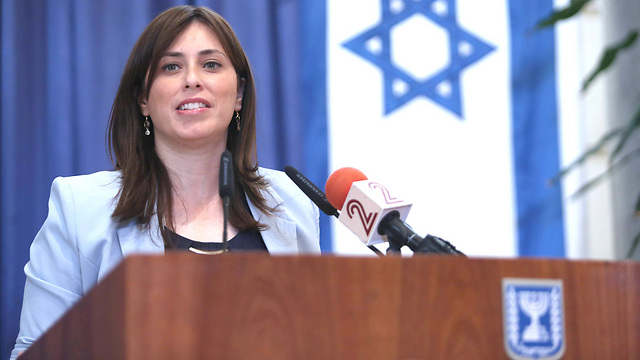
Josh Seitler decried comments made last November by Deputy Foreign Minister Tzipi Hotovely, who sparked outrage when she said during an interview that Jews living in the US fail to understand “the complexity of the region” and live “quite convenient lives.”
“On the one hand Netanyahu always presents himself as the prime minister of all the Jewish people. On the other hand, Tzipi Hotoveli tells Jews in the Diaspora not to interfere in what’s happening in Israel. So what do you want us to understand from this?” Seitler asked.
With a half smile on his face, Seitler raised the question with which many Jews in the diaspora have continuously grappled: Does the project dubbed “Israel—the State of the Jewish People”—apply only to those within the Jewish state or also those outside it?
Seitler spent time in Israel over the last few months in the MASA program that brings young Jews from the Diaspora to Israel, and he said he was trying to identify the fundamental differences between Judaism as practiced in the Diaspora and Judaism as practiced inside Israel.
“In England there are a number of streams, such as the Orthodox obviously, the Masorti movement (traditionalists) and the Reform movement. Unlike Israel, there is a lot more leniency shown by the Orthodox. They are more open, ready for dialogue and as a principle try to avoid conflict among the Jewish community.
It was a regrettable reality, Seitler said, that anti-Semitism may be the key factor that unites all the Jewish streams.
“On university campuses, we sometimes encounter problems of Jewish identity and we try to create a place there in which everyone can feel good with with the Jewish association and with Judaism itself.”
To what extent is anti-Semitism felt on campus or on the streets?
“I have seen only a number of anti-Semitic incidents in England. It isn’t hard to be a Jew in England and the community is strong enough and close enough to senior officials in the government and to leaders of other communities,” he said.
“Many in the Boycott, Divestment, Sanctions (BDS) movement automatically identify Jews with Israel and claim, for example, that if you are Jewish then you automatically kill children in Gaza.”
Recently, a significant rift has developed between US Jewry and the Israeli leadership. How do you see the relationship between Israel and the British Jewish community?
“I think that we have a different conversation to the one that is taking place in the US. We live in Europe, we remember the Holocaust and we have a strong connection to Israel. Obviously there are moments when we can get annoyed or protest against things that the Israeli government does or statements made by the leaders or others, but I believe that this also works in the opposite direction and in Israel they are not always alright with what is happening in Britain, and that is totally legitimate.
“What Hotoveli doesn’t understand is that we also pay the price for things Israel does and that can’t be ignored, even if we don’t physically live in Israel.”
The struggle against BDS on campuses
Like in the US, university campuses are a hotbed of anti-Israel activity. The BDS movement is one of the strongest in the battlefield of ideas and is faced by and large by Jewish student groups which are assisted by Israeli representatives.
According to Seitler, there are 18,000 Jewish students in the UK but he points out that not all of them identify with Israel’s struggle, and some have even joined the ranks of the BDS movement.
Expanding on his belief that the BDS is a smart concept, Seitler said that while it is seldom an easy task to ask people to get out onto the streets and actively protests against something, asking people to refrain from purchasing an Israeli product is a far easier and more realistic goal.
“I think ignoring them is not the solution. As long as we learn more about the conflict and teach others it will be easier to fight against it in effective ways,” he reasoned.
“It is obvious that the moment this slides into anti-Semitism, we are already in a more difficult situation and we need to respond with greater force.”
'Sometimes creative thought is missing in the UK'
Throughout the years, the number of Jews from England immigrating to Israel has been comparatively low by European standards. Their lifestyle is considered comfortable and their British mentality is enough to convince many to remain in London and other cities with a notable Jewish presence dotted throughout the country.
But Seitler is considering staying in Israel. “In the last six months, as part of the MASA careers program, I went through a wonderful process and I am really another person. I met a lot of people: Jews from all over the world, religious, secular, Arabs, Palestinians and different leaders. Where else could I do so much at the age of 23?” he asked. “There’s an open mentality here and creative thinking and these are the things that are missing for us sometimes in Britain,” he said.
“In the program we live in the heart of Tel Aviv and really live their lives, not in some bubble wherever. Where else could I have done an interesting internship at a startup except here? All this experience creates brilliant networking for me and I hope to stay in Israel,” he concludes.


















